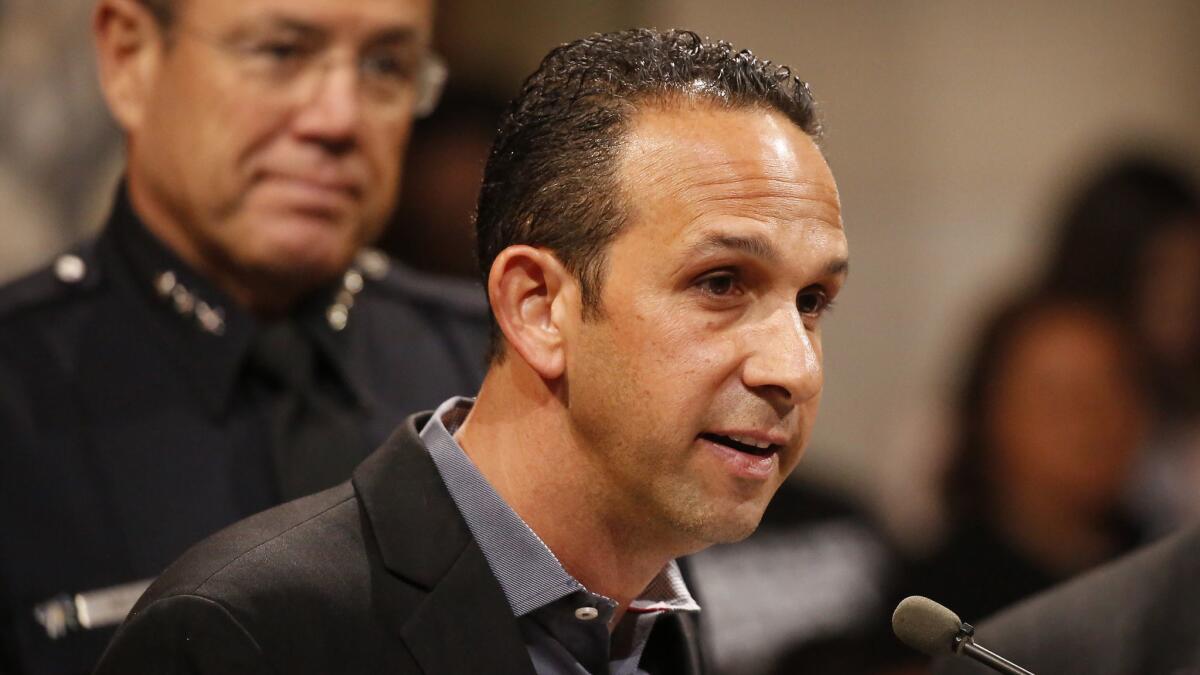Column: Mitch Englander deserves more than a slap on the wrist. Put this man in prison

Mitchell Englander betrayed the public trust and he should go to prison for his crimes.
Yes, locking people up is costly to taxpayers, and the United States does too much of it. We need to think about whether we’re jailing people unnecessarily or counterproductively, and Englander, a former Los Angeles councilman with no previous criminal history, doesn’t pose an immediate danger on the streets the way a freed serial killer would.
But in this case, some time behind bars is warranted.
Englander, you’ll remember, was indicted in January 2020. He was accused of pocketing envelopes containing a total of $15,000 in cash on two occasions in two casino bathrooms and taking tens of thousands of dollars in lavish meals and alcohol — all courtesy of a businessman seeking to increase his business in the city. The businessman also paid a female escort to provide him with “services.”
After first lying in an effort to save himself, Englander ultimately agreed to a deal with prosecutors in which he acknowledged many of the basic facts in the indictment. He pleaded guilty to a single felony count of “falsifying material facts” to federal officials.
Englander’s sentencing is scheduled for Jan. 25, and the pressure is on from his lawyers and from the federal probation department to hand him a light sentence: three years’ probation, a $9,500 fine, no community service and no time in prison.
This is a man who had not only sworn to serve the interests of his San Fernando Valley constituents; as a reserve officer in the Los Angeles Police Department, he had sworn to uphold the law. .
He knew better than to take this money, but he took it anyway. The government does not allege bribery — there was no known quid pro quo — but it is obvious that accepting such lavish gifts left him open to what prosecutors called “distasteful requests or demands.”
Subsequently, Englander engaged in a campaign of “false statements, obstruction and witness tampering,” according to prosecutors. Englander denies having engaged in obstruction of justice or witness tampering, but he acknowledges taking the money and lying.
This is the stuff of tawdry pulp fiction and bad TV drama, but it is also serious criminality. The single count to which Englander pleaded guilty carries a maximum penalty of five years in prison and a $250,000 fine.
And the arguments in favor of a slap on the wrist are unpersuasive. He’s a good father and a loving husband? That’s nice, but that doesn’t explain, justify or forgive his transgressions.
He’s a “dedicated community leader”? Well, apparently he wasn’t as dedicated and selfless as his constituents might have hoped.
He’s demonstrated a lifetime of law-abiding behavior, if you don’t count this one? As far as we know.
Perhaps his strongest argument is that yes, he took the thousands of dollars in gifts, services and wads of bills from the eager businessman — but he was never charged with doing anything for the businessman in return. I find that only mildly comforting.
And as for remorse — well, of course he’s remorseful. Everyone is when they get caught.
Sentencing is a complicated affair, as it should be. We want punishment to be consistent and fairly meted out. We want it to be proportionate to the crime. We want to avoid pointless retribution while emphasizing rehabilitation and mercy where appropriate.
What’s more, there are complicated issues involving the application of federal sentencing guidelines (which are advisory, not mandatory) that the judge has to consider.
But some crimes require a substantial response.
Governmental corruption is a scourge. When it is not punished effectively, society sends the message that it doesn’t matter, that betraying the public trust isn’t as serious as other forms of crime that regularly land people in prison. If crimes of corruption don’t carry serious consequences, that emboldens others.
Deterrence is especially effective in cases such as Englander’s, prosecutors noted, because corruption of this sort is often premeditated, and its perpetrators are more likely to engage in a rational cost-benefit analysis than those who commit sudden crimes of passion or opportunity.
The U.S. attorney’s office has asked that Englander be sentenced to 24 months’ imprisonment, 300 hours of community service and a $45,000 fine.
For his pattern of “coolly calculated criminality and trampled public trust,” prosecutors argued that Englander deserved “a meaningful term of imprisonment.”
I’m not a judge. I don’t know the exact sentence that would be appropriate, and I’m not saying that Englander deserves the harshest possible sentence.
But I can tell you as a citizen of the city of Los Angeles who was betrayed by a corrupt councilman on a series of Vegas and Palm Springs flings that a “meaningful term of imprisonment” sounds a lot more proportionate than a $9,500 fine.
More to Read
A cure for the common opinion
Get thought-provoking perspectives with our weekly newsletter.
You may occasionally receive promotional content from the Los Angeles Times.











